Meal prep, weight loss supplements and workout routines surface on the biggest platforms, one example being TikTok. TikTok influencers swarm the for you page to show the new 12-3-30 workout routine or lazy meal prep ideas. The constant need to lose weight or have the healthiest food choices can easily cause an eating disorder. So, is the meal prep obsession worth living the healthiest lifestyle with hidden consequences?
Meal prep is preparing your meals before the week starts. This also helps measure portions of protein, carbs and vegetables required for a diet. Meal prep is great for those who want to achieve a certain weight; however, this may lead to obsessions such as counting calories, reading product labels and eating under the number of calories you need in a day.
Weighing portions is a process many use for meal prep. This process is meant to cut excessive calories while eating the “correct” amount. Obsessively weighing portions can be dangerous. Yes, there is a certain amount of food people should intake, but, when does the limit become enough? Having to constantly worry if you are overeating a portion of rice or protein can be mentally draining.
Daily caloric intake depends on factors such as current weight, height, and activeness. According to healthline.com, the recommended number of calories women should intake ranges from 1,600 to 2400 and from 2,000 to 3,000 for men. Meal prep can cause many to cut portions. Cutting calories can then lead to a calorie deficit. I have been consumed by meal prep and the amount of guilt of eating surrounding me led to unhealthy eating patterns.
As someone who has constantly struggled with binge eating, I decided to change my eating habits. The summer after my first year at UTEP, my eating patterns became worse. I was working out more than I was eating. I would skip meals or when I did prep my meals, I would make them as healthy as possible. This caused me to constantly feel hungry, but I would ignore it. The more I saw progress in my weight dropping the less I cared; as long as I was losing weight, I was happier with losing it than fueling my body.
As I progressed along my weight loss journey, I became more obsessed with reading calorie labels. I started eating snacks and meals that were from 100-300 calories. I became so obsessed with living the healthy fit girl lifestyle while ignoring my mental health.
According to Jonathan Scarff at the National Library of Medicine, this can lead to orthorexia nervosa which is an obsessive disorder around food.
“Orthorexia Nervosa is perhaps best summarized as an obsession with healthy eating with associated restrictive behaviors,” Scarff said.
Becoming more obsessed with the idea of being skinny made my eating habits worse. I was not diagnosed with orthorexia nervosa; however, I realize that I was obsessed with being healthy. I had so much anxiety about eating that I limited myself. Now that I have moved out, I am continuing to work on my eating habits. When I meal prepped or when I would see my roommate meal prep, I noticed how limiting it was. My anxiety has lessened as I now eat when I am hungry. Now I make my meals when it is time to eat.
Meal prepping is a great way to save time, especially if you have a busy schedule during the week. However, if meals are not prepared correctly or are made to be the healthiest meal, then this can lead to further problems. Eating disorders are not directly caused by meal prep, however, it is the way you prep your meals what causes the problem.
UTEP mental health services are provided at CAPS for anyone who might be suffering from mental health issues or eating disorders. They can be contacted at 915-747-5302 or 202 Union West.
Avery Escamilla-Wendell is the staff reporter and may be reached at [email protected] or on Instagram @by_avery_escamilla











